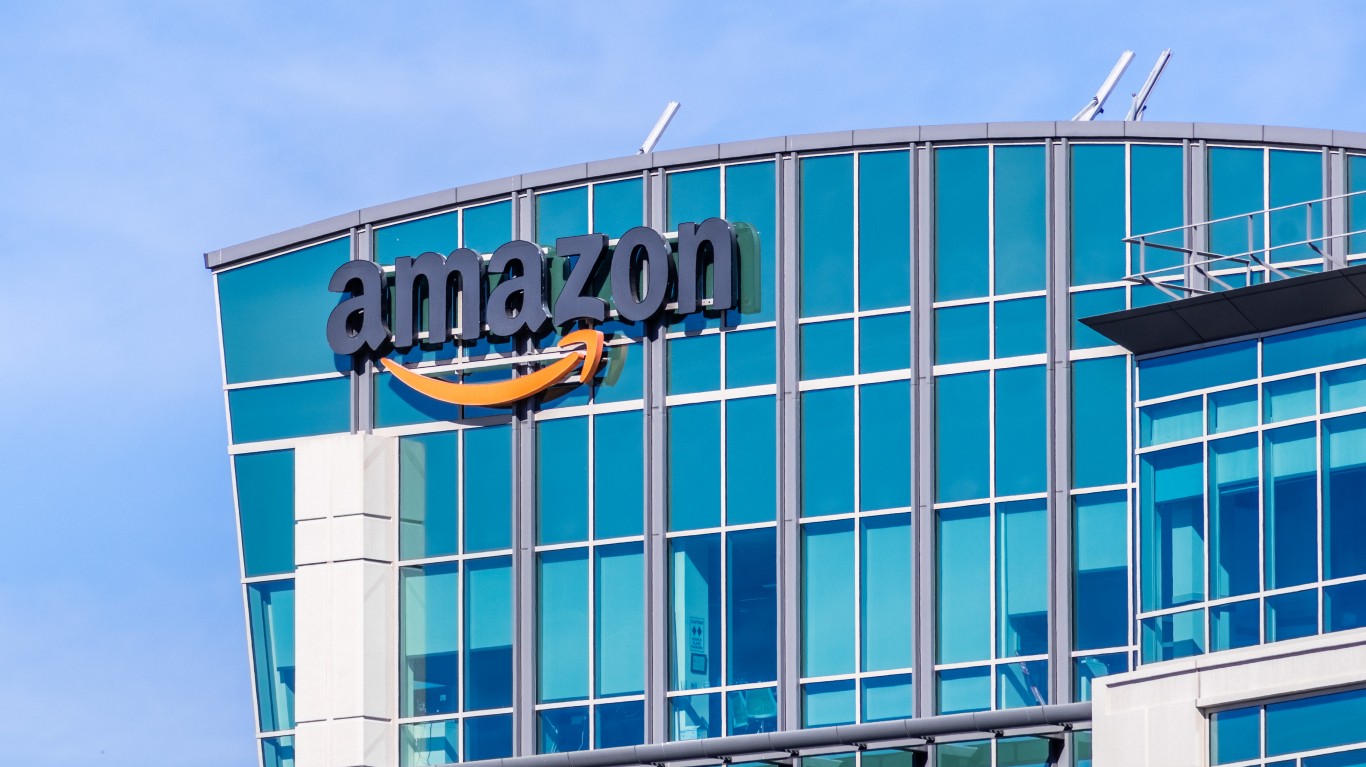
While the coronavirus-related shutdowns did wonders for Amazon.com Inc.’s (NASDAQ: AMZN) e-commerce delivery business, the online retailing giant hasn’t entirely abandoned the physical store format. In fact, the Seattle-based company is building out a new brick-and-mortar brand right now, even as America’s retailers dig out from the COVID-19 pandemic.
The move is a sign of Amazon’s dominance and innovation in retail sales. Even as local businesses are suffering, Amazon is confident there’s still a place for physical retail.
And the stores offer Amazon another opportunity to market its digital devices, such as the Kindle. These retail stores are a tiny part of Amazon’s overall business, but may offer important branding value over time.
Overall, analysts have nothing but love for Amazon lately. Many have boosted their price targets for the stock to over $3,000.
Along with the overall market, Amazon dropped substantially Thursday. The stock closed at $2,557.96, down 3.4%. Investors were reacting to worrying signs about coronavirus cases and the broader economy. There was also late breaking news about an antitrust case against Amazon in Europe.
Namesake Store
Called Amazon 4-star, the new retail outlets have already opened in some cities while others are being built. Right now, stores are open in Colorado and Texas. Other locations, including New York City and Seattle, are closed temporarily due to the coronavirus.
The company has announced plans for 30 locations in 17 states. Coming soon are stores in Arizona, Florida, Georgia, Maryland, New Jersey and North Carolina. Even the famed Mall of America in Bloomington, Minnesota, will be getting a 4-star.
As the name implies, the stores carry mostly products that have been reviewed four stars and above by Amazon’s online customers. Store curators may include some items with lower ratings and new trending items.
The stores will carry a limited selection of items sold on Amazon.com, including consumer electronics, toys, games, books, home items and more. Amazon sees 4-star as an extension of Amazon.com, and will mimic some popular online features such as “Most Wished-For” merchandise and “If You Like, Then You’ll Love” sections.
“Our team of curators looks at pre-orders, sales trends, customer reviews and ratings, customer wish lists, and what amazon.com editorial teams have curated online to select only the most-loved amazon.com products for our store,” the company said on its website.
Amazon Prime members who visit 4-star shops will get special discounted prices, which will be displayed alongside the normal retail price. Amazon will use the stores to try to upsell Prime memberships, which will be offered in free 30-day trials in the stores.
Amazon 4-star locations will also offer an opportunity for consumers to try out Amazon devices. Customers can test drive the Echo, Kindle, Fire TV and Fire Tablet. And Amazon employees will be on hand to answer questions, the company said.
This isn’t Amazon’s first go at in-store sales of its own devices. After Amazon purchased the Whole Foods grocery store chain, it displayed and sold Alexa speakers alongside fresh produce and other staples.
Amazon 4-star shouldn’t be confused with Amazon Go or Amazon Books, which are separate retail stores. There are currently plans for 24 Amazon Books stores. Amazon Go, which sells food, has locations in New York, Chicago, San Francisco and Seattle. Many of these are also temporarily closed.
Amazon Go is the sophisticated prototype grocery store that the company is testing. Instead of using cash registers, high-tech scanners charge consumers for each item they remove from store shelves. They simply walk out when they’ve completed their shopping list. The technology could impact the entire future of in-person shopping.
The company also has a handful of Amazon Pop Up stores that feature a “try-before-you-buy” experience for products like AmazonBasics Bedding.
Analyst Love
Earlier this week, RBC Capital Markets boosted its price target to $3,300, the highest target currently set for Amazon. The average target sits at $2,623.53.
Besides RBC, other analysts also boosted their targets this week: Jefferies Financial Group ($3,100), Bank of America ($3,000) and Robert W. Baird ($2,750).
Amazon has a whopping 44 Buy recommendations, three Holds and one Sell. Wells Fargo & Co. and the Royal Bank of Canada reiterated their Buy ratings this week.
In revising its price target, RBC Capital said its recent survey of online shopping behavior shows that “Amazon is likely the best global play off of online retail.” Consumers surveyed by RBC said they were shopping more at Amazon.com.
The survey also found more shoppers have become Prime members: 67% said they were Prime members, compared with 59% in 2019.
Overall, RBC predicts that the COVID-19 shift to online shopping has permanently altered consumer behavior. The firm found that other online retailers, such as Walmart, eBay and Etsy are also doing very well in this environment.
To meet the increased demand, Amazon hired 175,000 temporary workers this spring. Many of those roles are being converted to permanent status. By April, the company had over 935,000 employees. That’s a lot, but Walmart employs more, 2.2 million worldwide and 1.5 million in the U.S.
Antitrust Case
In a rare bit of negative news for Jeff Bezos’ company, The Wall Street Journal reported Thursday that an antitrust lawsuit is imminent.
The newspaper said European Union officials are preparing to charge Amazon with abusing its power to squash smaller rivals. The action is expected in the next couple of weeks.
Regulators are focused on the allegation that Amazon scoops up data from third-party sellers and uses that info to undercut them. An earlier Journal investigation, based on interviews with former Amazon employees, said the company sometimes used data on third-party sellers to develop its own rival products.
Amazon didn’t comment on the Journal report, but in the past has denied violating any antitrust laws.
The EU case against Amazon is just the latest of many antitrust investigations on both sides of the Atlantic against big tech companies, including Google, Facebook and Apple. European regulators have been more aggressive, and their case against Amazon could be one of their biggest.
Last year, the EU fined Google 1.7 billion Euros for abusing its power in the online advertising market. It was the third huge fine the Union levied on the search giant.
Take Charge of Your Retirement In Just A Few Minutes (Sponsor)
Retirement planning doesn’t have to feel overwhelming. The key is finding expert guidance—and SmartAsset’s simple quiz makes it easier than ever for you to connect with a vetted financial advisor.
Here’s how it works:
- Answer a Few Simple Questions. Tell us a bit about your goals and preferences—it only takes a few minutes!
- Get Matched with Vetted Advisors Our smart tool matches you with up to three pre-screened, vetted advisors who serve your area and are held to a fiduciary standard to act in your best interests. Click here to begin
- Choose Your Fit Review their profiles, schedule an introductory call (or meet in person), and select the advisor who feel is right for you.
Why wait? Start building the retirement you’ve always dreamed of. Click here to get started today!
Thank you for reading! Have some feedback for us?
Contact the 24/7 Wall St. editorial team.
 24/7 Wall St.
24/7 Wall St.

